We may not have the course you’re looking for. If you enquire or give us a call on +44 1344 203 999 and speak to our training experts, we may still be able to help with your training requirements.
Training Outcomes Within Your Budget!
We ensure quality, budget-alignment, and timely delivery by our expert instructors.

From phones to televisions, refrigerators to cars and medical equipment to aeroplanes, the ubiquity and utility of software have been nothing short of awe-inspiring. It’s the technological lifeblood of all modern devices, and Software Developers rightfully stand as champions of the digital age, driving unprecedented innovation. Consequently, Software Developer Skills are highly valued across industries.
This is validated by the fact that an individual in this profession earns an average salary of £43,381 per year in the UK. This blog encompasses all the Software Developer Skills you will need to thrive in this line of work, including programming proficiency, database management, cloud platform expertise, software frameworks and more. So, dive in and decode the path to your career growth.
Table of Contents
1) What are Software Developer Skills?
2) Technical Proficiency
3) Soft Skills
4) Problem-solving and Algorithmic Thinking
5) How to Improve Your Software Developer Skills
6) Conclusion
What are Software Developer Skills?
Software Developers, often regarded as the digital architects of our time, possess a rich combination of Skills integral to constructing the virtual landscapes we navigate daily. These skills encompass the expertise needed to craft effective programs and applications and often require mathematical knowledge and problem-solving abilities to write source code—the sequences of words and symbols enabling a program's operation. These skills include digital tools, programming languages, and computer systems. Many software developers acquire these skills through computer science degree programs or certification courses.
Attention to detail is paramount in a developer's role, with a rigorous scrutiny of code to rectify even the most minor errors, ensuring the reliability of the product. Adaptability requires developers to stay current with emerging technologies and adapt their skill sets accordingly. Creativity and collaboration are additional crucial skills for Software Developers. While creativity impacts code, User Interface (UI) design, and innovative problem-solving, collaboration necessitates clear communication to explain complex technical concepts to both technical and non-technical team members.
Technical Proficiency
Technical proficiency is the bedrock of a Software Developer's Skillset. The complete knowledge of programming languages, frameworks, version control, and databases empowers developers to craft efficient, scalable, and innovative solutions. Here's how:
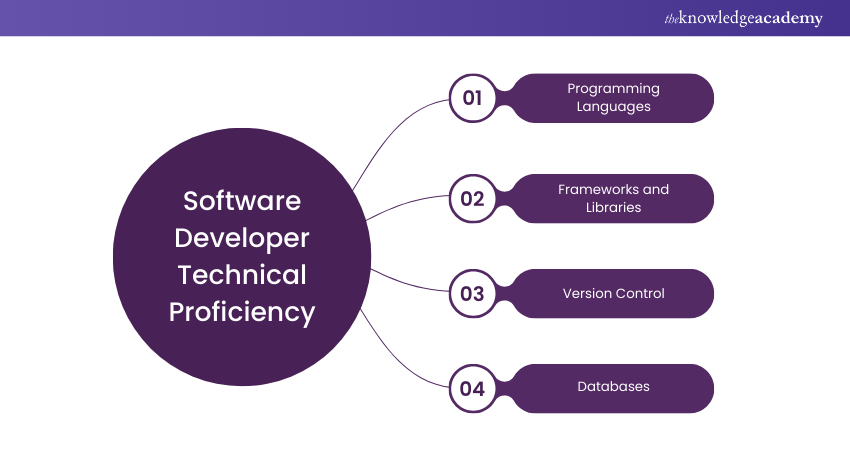
Programming Languages
Programming languages serve as the foundation upon which Software Developers build, innovate, and solve complex problems. Proficiency in programming languages is paramount for creating functional, efficient, and versatile applications. Here's a closer look at the significance of programming languages and their role in software development:
1) Versatility and Adaptability:
Different programming languages cater to various tasks and application domains. From Web Development (JavaScript, Python) to System-level Programming (C, C++), developers choose languages based on project requirements. This proficiency with different programming languages helps developers to be versatile and adapt to the new upcoming languages.
2) Problem-solving Capability:
Programming languages provide tools and constructs to translate abstract ideas into functional solutions. Developers can leverage these languages to implement algorithms, data structures, and logic to solve real-world challenges.
3) Development Speed:
Some languages, like Python and Ruby, prioritise readability and conciseness, allowing developers to write code more quickly. Others, such as Java, offer a balance between readability and performance. These programming languages should be known to all developers as it can help them identify the problems and make the necessary changes.
4) Ecosystem and Libraries:
Programming languages often come with rich ecosystems of libraries and frameworks that expedite development. For instance, JavaScript Developers can utilise libraries like React and Angular to streamline Web Development. This knowledge of different library sets helps the developers know what language to use to expedite the development.
5) Performance Optimisation:
Low-level languages like C and C++ offer fine-grained control over memory and system resources, making them suitable for applications where performance is critical. This knowledge of programming languages helps the developers to optimise their performances.
6) Scalability and Maintenance:
The choice of programming language can influence the scalability and maintainability of applications. Some languages lend themselves well to modular code, aiding in collaborative development and future updates.
7) Industry Trends:
Industry demand and trends also impact the choice of programming languages. For instance, Python's rise in popularity can be attributed to its applications in Data Science, Machine Learning, and Automation. Developers who are at par with industry trends will be able to solve problems efficiently.
8) Learning Curve:
Each programming language has a unique syntax and set of rules. Developers proficient in multiple languages are better equipped to adapt to different projects and stay versatile in the ever-evolving tech landscape. Developers who have the skill to learn continuously will be able to cater to problems efficiently.
Elevate your Software Engineering skills with our Software Engineering Training - Join today!
Frameworks and Libraries
Frameworks and libraries are integral tools that accelerate Software Development by providing pre-built components, structures, and functionalities. They empower developers to streamline their workflow, enhance code efficiency, and create robust applications. Let's discuss the significance of frameworks and libraries in Software Development and how these Software Developer Skills can help developers gain a competitive edge:
1) Code Reusability:
Libraries contain reusable code modules that perform specific functions. Developers can integrate these modules into their applications, saving time and effort. This reusability enhances code consistency and minimises the chances of errors.
2) Consistency and Pest Practices:
Frameworks enforce coding standards and best practices, promoting consistency across the application. This ensures that developers adhere to industry standards, resulting in maintainable and well-structured code. This consistency helps the developers to be at par with the dynamic industry standards.
3) Scalability:
Many frameworks are designed to accommodate growing application needs. They provide tools to manage complex features, databases, and user interactions, facilitating the scalability of applications as user demands increase. Developers who follow these frameworks can better manage complex features and databases.
4)Security:
Frameworks often incorporate security features by default. This shields applications from common vulnerabilities and reduces the risk of security breaches. For instance, Web Development frameworks may include built-in protection against Cross-site Scripting (XSS) attacks. Knowing about these security measures helps the developers to incorporate these same features when they are working on any project.
Version control
Version control, also known as source control, is a crucial practice in Software Development that tracks changes to code over time. It provides developers with the means to manage multiple versions of code, collaborate seamlessly, and maintain code integrity. Let us see how:
1) History Tracking:
Version control systems maintain a detailed history of changes made to code. Developers can review previous versions, identify modifications, and trace the evolution of a project.
2) Collaboration:
In team-based development, version control fosters collaborative work. Several developers can work on the same project concurrently without overwriting each other's changes. Version control merges these changes intelligently, minimising conflicts.
3) Branching and Merging:
Version control systems facilitate branching, allowing developers to create separate lines of development. This enables the developers to better implement new features or bug fixes without affecting the main codebase. Merging branches back into the main codebase ensures a seamless integration of changes.
4) Code Recovery:
Accidental deletions or code errors can be corrected by reverting to a previous version. Version control acts as a safety net, enabling developers to recover lost or corrupted code. Developers should be proficient in version control as it helps them save a lot of time recovering the accidental deletion of codes.
5) Code Reviews:
Version control enhances code quality through systematic code reviews. Developers can review them and comment on changes before merging them into the main codebase, ensuring adherence to coding standards and best practices.
Databases
Databases play a pivotal role in modern Software Development by providing a structured mechanism to store, manage, and retrieve data. From small-scale applications to complex enterprise systems, databases are the backbone that ensures data integrity and accessibility. These points will explain how:
1) Data Storage and Retrieval:
Databases provide a structured environment to store various types of data, ranging from user information to product details. Developers can efficiently retrieve and manipulate this data, ensuring its availability whenever needed.
2) Data Integrity:
Databases enforce data integrity constraints, preventing the entry of invalid or inconsistent data. This ensures the accuracy and reliability of the stored information.
3) Efficient Searching and Querying:
Databases enable developers to execute powerful queries to retrieve specific data subsets. Indexing and optimisation techniques ensure that data retrieval is fast and efficient, even with large datasets.
4) Structured Organisation:
Data is organised into tables, rows, and columns, promoting a structured approach to data management. This structure enhances data organisation, searchability, and maintainability.
5) Data Relationships:
Databases support relationships between data entities. For instance, in a relational database, tables can be linked through primary and foreign keys, facilitating complex data relationships.
Integrated Development Environments (IDEs)
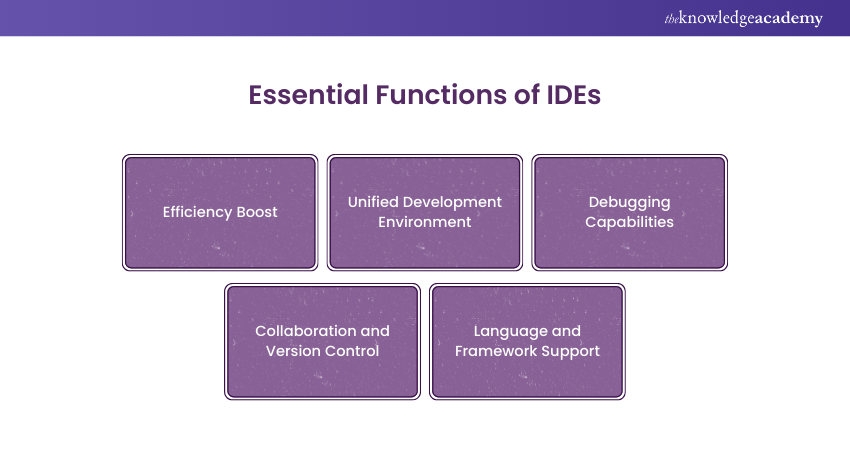
Integrated Development Environments or IDEs are essential tools that significantly impact the skill set of Software Developers in various ways:
1) Efficiency Boost:
IDEs streamline the coding process with features like code completion, syntax highlighting, and auto-formatting, enabling developers to write code more efficiently.
2) Unified Development Environment:
IDEs provide a centralised platform where developers can code, debug, and deploy applications, fostering a cohesive and integrated development environment.
3) Debugging Capabilities:
Built-in debugging tools within IDEs empower developers to identify and fix errors more effectively, reducing the time spent troubleshooting.
4) Collaboration and Version Control:
IDEs often integrate with version control systems, facilitating seamless collaboration among team members and ensuring the consistency of the codebase.
5) Language and Framework Support:
Modern IDEs support a wide range of programming languages and frameworks, demanding developers to adapt and stay informed about the latest features and updates.
Transform Your Software Development Skills! Join Our Comprehensive Agile Software Development Training Program Today and Lead Your Team to Success!
Operating Systems
Operating systems (OS) play a pivotal role in shaping the skill set of Software Developers. A profound understanding of OS is integral for developing efficient and reliable software. It enables efficient resource utilisation and concurrent processing and contributes to security, compatibility, and effective debugging, ultimately enhancing the overall skill set of developers. Here are five key points illustrating the significance of operating systems in the context of Software Developer Skills:
1) Resource Management:
OS provides a foundation for managing hardware resources, like memory and CPU usage. Developers must optimise their software to efficiently utilise these resources efficiently, ensuring optimal performance.
2) Concurrency and Multithreading:
Modern software often involves concurrent processes. OS knowledge equips developers to implement practical multithreading, enhancing the responsiveness and efficiency of their applications.
3) Security Implementation:
Understanding OS security features is crucial for developers to create robust and secure software. Knowledge of user permissions, file systems, and encryption contributes to building applications resistant to cyber threats.
4) Compatibility Considerations:
Different operating systems have varying requirements and constraints. Developers must consider OS-specific factors during the Software Development Lifecycle (SDLC) to ensure compatibility across diverse environments.
5) System-Level Debugging:
Proficiency in OS facilitates system-level debugging, allowing developers to identify and solve the issues that may arise at the interface between software and the underlying operating system.
Cloud platforms
A Software Developer's proficiency in cloud platforms such as AWS, Azure, and GCP is vital. These platforms enable efficient deployment, scalability, and resource management. Mastery in serverless architectures and security practices ensures the development of resilient and secure applications. Integration of continuous integration/continuous deployment (CI/CD) practices is essential for streamlined development workflows.
1) AWS, Azure, and GCP mastery:
A proficient Software Developer must navigate major cloud platforms like Amazon Web Services (AWS), Microsoft Azure, and Google Cloud Platform (GCP). Expertise in deploying, managing, and optimising applications on these platforms is paramount.
2) Scalability and Resource Management:
Understanding cloud scalability and efficient resource management ensures that developers can design applications capable of handling variable workloads, optimising performance and cost-effectiveness.
3) Serverless Architectures:
Proficiency in serverless computing models enables developers to build applications without managing server infrastructure, fostering agility and cost savings.
4) Security Practices:
Cloud security is a priority. Developers should grasp identity and access management, encryption, and other security practices to safeguard data and applications in the cloud.
5) Continuous Integration/Continuous Deployment (CI/CD):
Integrating CI/CD practices into cloud workflows ensures seamless development, testing, and deployment, enhancing the agility and reliability of software development.
Cryptography
Understanding cryptography is crucial for a Software Developer. It involves data encryption to safeguard sensitive information and implementing secure communication protocols like HTTPS. Public and private key infrastructure (PKI) mastery ensures robust authentication and authorisation mechanisms. Knowing hash functions and cryptographic libraries contributes to data integrity and secure management.
1) Data Encryption:
A skilled developer understands encryption algorithms and techniques, safeguarding sensitive data by changing it into unreadable styles that can only be deciphered with the appropriate keys.
2) Secure Communication Protocols:
Knowledge of secure communication protocols like HTTPS ensures that data transmission between applications is encrypted, protecting it from unauthorised access.
3) Public and Private Key Infrastructure (PKI):
Mastery of PKI provides secure key management for authentication and authorisation, which is vital for protecting data integrity and user privacy.
4) Hash Functions for Data Integrity:
Using hash functions, developers can verify data integrity by generating fixed-size hash codes and detecting any alterations to the original information.
5) Cryptographic Libraries:
Familiarity with cryptographic libraries like OpenSSL or Bouncy Castle facilitates the implementation of secure cryptographic protocols within software applications.
Debugging knowledge
Effective debugging is a crucial skill for Software Developers. It requires strong problem-solving abilities, proficiency in debugging tools, and the analysis of logs and error messages. Code profiling is essential for identifying performance bottlenecks, while continuous learning ensures developers stay adept at addressing complex software issues.
1) Problem-Solving Skills:
Debugging is an art that demands solid problem-solving skills. A skilled developer can identify, isolate, and resolve issues efficiently.
2) Proficiency in Debugging Tools:
Familiarity with debugging tools, whether integrated into an IDE or external, is crucial for efficiently tracing and fixing bugs in software code.
3) Log Analysis:
Understanding how to analyse logs and error messages aids in pinpointing the root cause of issues and streamlining the debugging process.
4) Code Profiling:
Profiling tools help identify performance bottlenecks and resource usage, allowing developers to optimise code for efficiency.
5) Continuous Learning:
Debugging is an evolving skill. A proactive approach to continuous learning about new debugging techniques and tools ensures developers stay adept at addressing complex software issues.
Git and GitHub
Version control is fundamental for software development, and Git proficiency is necessary. Understanding branching strategies, collaborative workflows, and repository management ensures organised and well-maintained codebases. Integration with CI/CD pipelines enhances automation and efficiency in the software development lifecycle.
1) Version Control Mastery:
Git proficiency is fundamental for version control, enabling developers to track changes, collaborate seamlessly, and manage code versions effectively.
2) Branching Strategies:
Understanding branching strategies facilitates parallel development, allowing the teams to work on features or bug fixes without interfering with the primary codebase.
3) Collaborative Workflow:
GitHub facilitates joint development through pull requests, code reviews, and issue tracking, fostering efficient communication and teamwork.
4) Repository Management:
Skill in repository management includes creating, branching, merging, and resolving conflicts, ensuring an organised and well-maintained codebase.
5) Integration with CI/CD:
Integrating Git repositories with CI/CD pipelines provides automated testing and deployment, streamlining the software development lifecycle for enhanced efficiency and reliability.
Scripting
Scripting languages like Python or Bash is an invaluable skill for Software Developers. They enable task automation, data manipulation, and efficient system administration. Proficiency in scripting facilitates integration with APIs, and cross-platform compatibility ensures versatile applications across different operating systems.
1) Automation of Tasks:
Scripting languages like Python or Bash enable developers to automate repetitive tasks, saving time by reducing the risk of human error in various development workflows.
2) Data Manipulation and Analysis:
Proficiency in scripting facilitates data manipulation and analysis, empowering developers to process and derive insights from large datasets efficiently.
3) System Administration:
Scripting is essential for system administration tasks, allowing developers to manage configurations, deploy updates, and maintain server environments programmatically.
4) Integration with APIs:
Scripting languages are crucial in integrating and interacting with APIs, enabling seamless communication between different software components.
5) Cross-platform Compatibility:
Scripting languages often offer cross-platform compatibility, allowing developers to write scripts that can run on various operating systems without modification, enhancing portability and versatility in development tasks.
Testing Procedures
A comprehensive testing process is a prerequisite for every software program before it can be released to consumers. This process, which involves the use of digital tools to ensure a product's functionality and adherence to design requirements, is crucial. It also includes checking a program's compatibility with various hardware devices and its ability to secure confidential information.
As companies often structure their testing processes around a few key components, it's beneficial for a software developer to grasp these fundamental aspects before applying for job positions. Here are three components of software testing that developers should be familiar with:
Unit testing: This test involves evaluating individual lines or areas of code to determine if they require modification. For every project, developers often create a different unit test to ensure they examine a program's key elements.
Integration testing: Software developers use integration testing to determine whether different areas of a program's code can be successfully merged and to observe how one software program interacts with the code of another.
System testing: After integration testing, an external testing professional typically conducts this process to determine if a product fulfils user expectations. A software developer must understand the steps of this process, as testing professionals often communicate vital suggestions for alterations.
Soft Skills
Soft skills are the interpersonal attributes that enhance a Software Developer's effectiveness in teamwork, communication, and Project Management. These Software Developer Skills are crucial not only to excel in your career but to grow as a person. Let's see how:
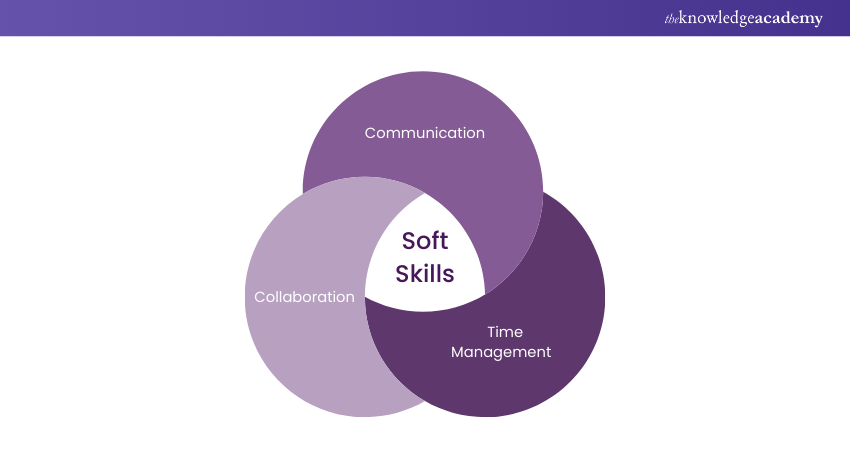
Communication
Effective communication is a cornerstone of successful software development, ensuring that team members collaborate seamlessly, stakeholders remain informed, and project goals are achieved. Let's explore the multifaceted significance of communication in the realm of software development:
1) Requirements Gathering: Clear communication with stakeholders is essential for understanding project requirements. Developers need to ask probing questions to elicit precise details and align their understanding with the client's vision.
2) Team Collaboration: Software Development often involves multidisciplinary teams. Clear and open communication ensures that team members work harmoniously, share insights, and collaborate to solve challenges.
3) Task Assignment and Tracking: Communicating task assignments, deadlines, and progress updates keeps the team aligned. This transparency enables managers to track project milestones and make informed decisions.
4) Problem-solving: Effective communication enables developers to discuss challenges openly, seek help, and brainstorm solutions. Collaborative problem-solving fosters innovation and prevents roadblocks from impeding progress.
5) Code Reviews: Communication during code reviews is crucial for maintaining code quality. Developers can provide feedback, suggest improvements, and ensure that coding standards are upheld.
Collaboration
Collaboration is another important aspect of a Software Developer’s Skills. It brings together diverse skills, perspectives, and expertise to create successful and innovative solutions. Here's a closer look at how collaboration works:
1) Cross-functional Teams: Software Development projects often require contributions from various disciplines, such as developers, designers, testers, and Project Managers. Collaborative cross-functional teams ensure that each aspect of the project is addressed comprehensively.
2) Idea Generation: Collaboration encourages the free exchange of ideas. Developers from different backgrounds need to brainstorm and offer unique insights that spark creativity and lead to innovative solutions.
3) Problem-solving: Complex challenges in Software Development are often best tackled collaboratively. Team members can bring various perspectives to the table, identifying potential solutions that might not have been apparent individually.
4) Knowledge Sharing: Collaboration fosters knowledge sharing within teams. Developers can share best practices, tips, and lessons learned, promoting continuous learning and skill enhancement.
Time Management
Effective time management is a cornerstone of successful Software Development, ensuring that projects are completed on schedule, resources are optimally utilised, and quality is maintained. Here's how time management plays a pivotal role:
1) Prioritisation: Software Development involves numerous tasks and responsibilities. Time management helps developers prioritise tasks based on urgency and importance, ensuring that critical aspects are addressed first.
2) Project Planning: Developing a well-structured project plan sets the foundation for effective time management.
3) Resource Allocation: Time management ensures that resources, including developer hours, tools, and infrastructure, are allocated efficiently. This prevents overloading team members and prevents bottlenecks.
4) Meeting Deadlines: Timely completion of projects is crucial in a competitive landscape. Effectively managing time enables developers to meet deadlines and deliver projects on time.
5) Task Estimation: Accurate estimation of task durations is essential for project planning. Effective time management involves realistic estimation, preventing unexpected delays and ensuring projects stay on track.
Master Java programming and Software Engineering fundamentals with our Java Programming and Software Engineering Fundamentals Training .
Problem-solving and Algorithmic Thinking
Problem-solving and algorithmic thinking enable developers like you to dissect complex challenges, design efficient solutions, and create innovative applications. Here's a closer look at the significance of problem-solving and algorithmic thinking:
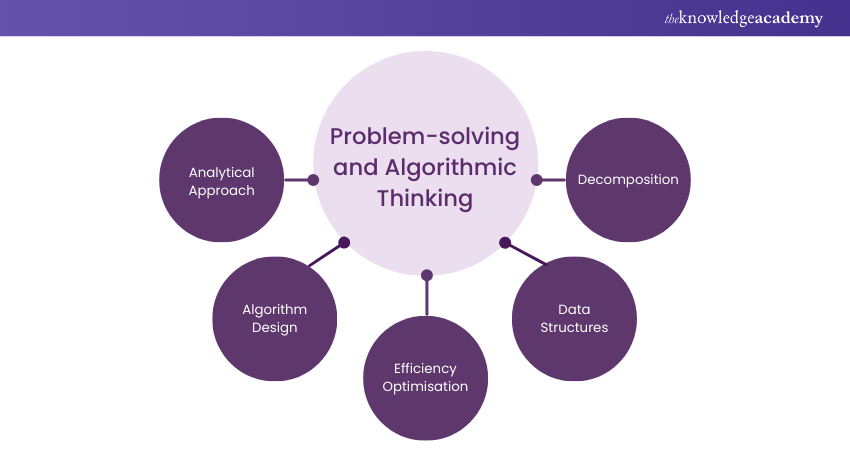
1) Analytical Approach: Problem-solving begins with breaking down complex issues into smaller, manageable components. Developers analyse the problem's structure, requirements, and constraints to identify a clear path forward.
2) Algorithm Design: Algorithmic thinking involves devising step-by-step procedures to solve specific problems. Developers design algorithms that optimise tasks like sorting, searching, and data manipulation.
3) Efficiency Optimisation: Algorithmic thinking emphasises efficiency in code execution. Developers strive to create algorithms with minimal time and resource complexity, ensuring that applications perform well.
4) Data Structures: Problem-solving requires a deep understanding of data structures like linked lists, arrays, trees, and graphs. Selecting the appropriate data structure influences how efficiently data can be stored and manipulated.
5) Decomposition: Complex problems are often broken down into smaller sub-problems. This approach simplifies the solution process and allows developers to tackle each sub-problem systematically.
How to Improve Your Software Developer Skills
Improving your Software Developer Skills is essential for staying competitive and ensuring career growth. Here are some effective strategies to enhance your skills:
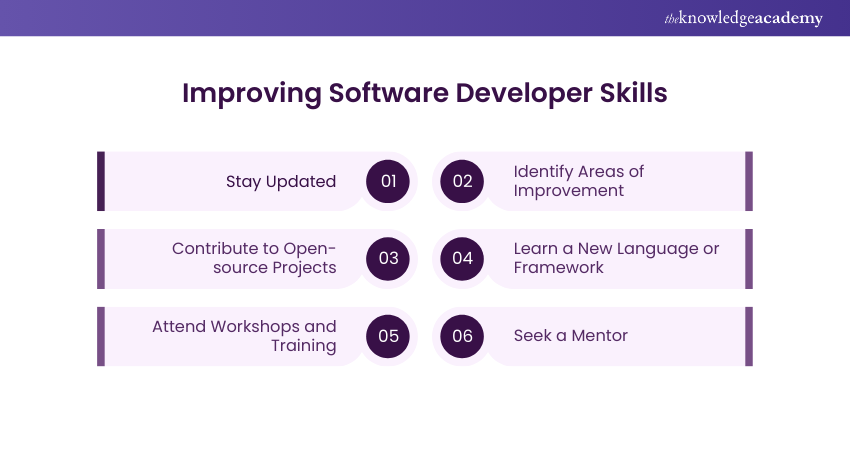
a) Stay Updated: Read articles, blogs, listen to podcasts, and watch videos related to software development. Follow YouTube channels that cover new programming languages, frameworks, libraries, and technologies.
b) Identify Areas for Improvement: Reflect on your workplace performance and pinpoint technical skills you want to enhance. Knowing the specific areas to develop will help you channel your energy effectively.
c) Contribute to Open-Source Projects: Contributing to open-source projects bridges the gap between novice and intermediate developer levels. It offers practical experience and valuable exposure to real-world codebases.
d) Learn a New Language or Framework: Learning about new technologies expands your skillset and keep you versatile and adaptable. Engage in online courses, tutorials, and books covering diverse programming languages, design patterns, methodologies and algorithms.
e) Attend Workshops and Training: Participate in webinars, workshops and coding boot camps. These hands-on experiences can accelerate your learning and provide indispensable insights.
f) Seek a Mentor: It’s important that you find a mentor who can guide you, review your code, and offer constructive feedback. This can contribute greatly to skill development.
Conclusion
From technical proficiency and problem-solving skills to soft skills, these aptitudes collectively make Software Developer Skills. Embracing these skills empowers developers like you to innovate, adapt, and thrive in the dynamic industry of technology. So, acquire these skills today and excel in your software Developer career path.
Unlock the art of software design and architecture – register now in our Software Design and Architecture Training.
Frequently Asked Questions

Starting out in Software Development requires a solid foundation in Computer Science and becoming proficient in at least one programming language. You can take formal education, such as a computer science degree, or through self-learning, online courses, and coding bootcamps.

Software Engineers deal with software systems and architecture on a broader level, often working on a project's initial design and planning stages. Software Developers usually focus on writing, debugging, and testing code, bringing the engineer’s design to life.

The Knowledge Academy takes global learning to new heights, offering over 30,000 online courses across 490+ locations in 220 countries. This expansive reach ensures accessibility and convenience for learners worldwide.
Alongside our diverse Online Course Catalogue, encompassing 17 major categories, we go the extra mile by providing a plethora of free educational Online Resources like News updates, Blogs, videos, webinars, and Interview Questions. Tailoring learning experiences further, professionals can maximise value with customisable Course Bundles of TKA.

The Knowledge Academy’s Knowledge Pass, a prepaid voucher, adds another layer of flexibility, allowing course bookings over a 12-month period. Join us on a journey where education knows no bounds.

The Knowledge Academy offers various Software Engineering Courses including Systems Engineering Training, Software Development and Lifecyle Training etc. These courses cater to different skill levels by providing comprehensive insights into the role of Software Architect .
Our Programming and DevOps Blogs cover a range of topics related to Software Developer Skills offering valuable resources, best practices, and industry insights. Whether you are a beginner or looking to advance your Software skills expertise, The Knowledge Academy's diverse courses and informative blogs have you covered.







 Top Rated Course
Top Rated Course




 If you wish to make any changes to your course, please
If you wish to make any changes to your course, please


